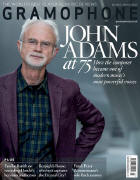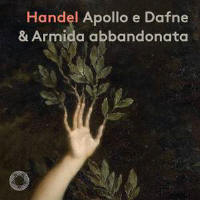Texte paru dans: / Appeared in: |
|
|
Outil de traduction |
|
|
Reviewer:
David Vickers Francesco Corti uses orchestral pieces to creatively flesh out a programme presenting a pair of Handel’s best-known cantate con stromenti. The lone source of the Overture in B flat (HWV336) is an anthology published in 1758 but on stylistic grounds it is surely an authentic early Italian-period work, not least on account of its similarities to the introductions of both Handel’s Roman oratorios. Il Pomo d’Oro’s supple playing of this relative obscurity forms a vivacious overture to Armida abbandonata (Rome, May-June 1707). Kathryn Lewek’s melodramatic enactment of the forsaken sorceress’s soliloquy encompasses a contoured range of oscillating emotions: breathless panic at watching Rinaldo’s ship sail away over the horizon, melancholic despair in the exquisitely sung lament ‘Ah, crudele! E pur ten vai’, wild vengefulness (the furioso accompagnato ‘O voi, dell’ incostante’), mingled imperiousness and hysteria as Armida brings the stormy seas back under her control (‘Venti, fermate, sì’) and heartbreak in the siciliana ‘In tanti affanni miei’. The Overture from Handel’s first opera Almira (Hamburg, 1705) makes for a vigorously jolting prelude to Apollo e Dafne, a dialogue cantata begun in Venice at around the same time as Agrippina (Carnival 1709/10), but finished after he had moved to Hanover. John Chest’s flamboyant heartiness and Il Pomo d’Oro’s zesty playing aptly illustrate Apollo’s conceited praise of his own heroism in ‘Spezza l’arco e getta l’armi’. Dafne’s arrival in ‘Felicissima quest’ alma ch’ama sol la libertà’ partners Lewek’s sensuousness with Christopher Palameta’s rapturous oboe, accompanied by shaded pizzicato strings. The nymph’s other arias are interpreted as disdain with hints of mockery, and her desperation has feistiness. The god of music’s attempt at seduction depicted in ‘Come rosa in su la spina’, with lightly punctuating strings giving subtle background to Felix Knecht’s rapier-like cello obbligato, could have been treated a little more like a hushed insinuation. Every ounce of dramatic characterisation is reaped during confrontational duets. Apollo’s rapacious chase in ‘Mie piante correte’ is reinforced by Corti’s rapid speed, Chest’s agility and the nimble virtuosity of concertante violinist Zefira Valova and bassoonist Katrin Lazar. Its interruption when Apollo witnesses Dafne’s metamorphosis lacks wondrous astonishment, but the pacing and mood of his concluding tribute that henceforth all heroes shall wear a laurel wreath are judged tenderly. Six Almira dances form an epilogue, albeit one that causes an awkward gear-shift between Handel’s juvenile writing and the enriched sophistication of his post-Italian mastery. |
|




